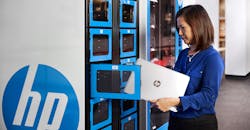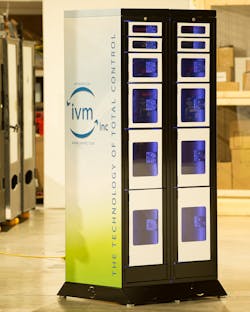Quantity Control: How Smart Vending Machines Can Boost Productivity & Safety
On a recent trip to California, a friend here in the office got a tour of Facebook's Menlo Park headquarters. I expected him to come back with exciting stories about its massive open spaces, its rooftop garden paradise, or at least the free ice cream.
Instead, all he could talk about were the vending machines.
On the surface, that seemed a little weird. But, he noted, they weren't your typical snack dispensers.
Facebook, like many such companies lately, has adopted a new breed of smart vending machines designed to provide office tech essentials—keyboards, mice, cables, even headphones—directly to workers whenever they are required. With a quick scan of a badge, employees get what they need without fighting through the sometimes lengthy, always aggravating IT request process.
The result, they say, can be dramatic increases in productivity for both the workers who need this stuff and for the IT departments that have much more important things to do than dole out power cords.
But the technology isn't restricted to just office spaces and fancy internet companies. Over the past few decades, these vending machines have been slowly popping up in factories and plants all over the world to automate (and track) delivery of everything from tools and safety equipment to healthcare supplies.
To find out more about this growing trend, we tracked down Michael Pitts, president of IVM, Inc., Facebook's vending machine vendor and a driving force behind this smart vending trend.
Let's start with the basics. What on earth is a smart vending machine?
Basically, a smart vending machine allows users to track the distribution of products that they have to give employees so their employees can do their job.
If you saw our machine next to any other vending machine, you'd probably think they look just alike—they look like they could be filled with candy bars or chips or whatever. The difference is that all of our machines have a completely different internal system. The systems all speak to our servers so they're all connected to us no matter where they are in the world.
It's becoming the norm for clients to get product into the hands of their employees. And not just getting the products into their hands, doing so in an efficient manner. Employees don't have to wait for someone to give them the tools they need or to go track down a supervisor. They can just go to the machine, scan their employee ID badge, and it vends whatever they need.
What about the "smart" part of it? What's the advantage to having these machines online and connected?
Well, companies can not only place restrictions on what certain employees can or cannot vend and how much they can vend and how frequently, but they also have the opportunity to know what an employee has vended.
For instance, you have the ability to know that your employees have been vending hearing protection before every shift.
Hearing loss, we all know, can be a cumulative problem. So our clients can come to us and ask how often a certain employee vended hearing protection over the past 12 years. And we can pull that data and show their legal department every time he or she has vended hearing protection. So you've just mitigated 12 years of hearing loss that is not the responsibility of the company.
There also seems to be a possible efficiency gain here. Workers aren't going rifling through filing cabinets trying to find what they need anymore, and they wouldn't have to hoard supplies, right?
Exactly. A good example of that is right here in Indianapolis where we're located. There's a Carrier plant here that had one tool crib where they handed out all their cut-resistant gloves. They realized that from the time somebody left their assembly station to go to the tool crib and back was costing them anywhere from 12 to 18 minutes of productivity.
So they put eight of our machines at strategic locations around the plant and reduced that time to just two or three minutes.
But, in the process they also found out that they reduced the use of gloves by 80%. Because now people aren't going to grab a pack of 12 and throw them in their locker, they're just going to get what they need and move on. That alone saved them almost $72,000 a year.
I see that your company has been at this since the 1990s, which seems amazing from a technology standpoint alone. How did you get such an early start in this?
Well, it was kind of forced on us. Our roots go back to traditional vending machines, and when I say that it's exactly what you think when I say "vending machine."
Union Pacific was one of our clients. At the time, they would set all their personal protective equipment products out on a table and people would just take them. They had no idea who took them or how much they took.
Then one day, one of the directors there was watching a gardening show and the host was wearing a pair of gloves that had the Union Pacific Railroad logo on them. And he's just scratching his head wondering how on earth the guy got those gloves, which were exclusive to Union Pacific.
So they asked us to come up with a system that would control the distribution of these products. And that's when we invented supply vending.
At that point, it was a very clunky system. We just had a card reader that would load the data on who did what, and when we wanted that data we had to send a new card reader to be switched out of the machine.
And boy, when we got those dialup modems, we thought we died and went to heaven because we could just download machine data whenever we wanted.
Now, my goodness, it's all wireless and cellular technology. It takes anywhere from five to eight seconds to vend something no matter where you are in the world, and it all connects back to our servers here, so our clients have all the data they need.
You mentioned a couple of variations of solutions here. Do you do a lot of customizations for your clients?
Every client is different. Let's talk about Facebook, for instance. Facebook puts our machines and lockers out all over the world. They typically vend IT peripherals because that's what their employees use—keyboard, flashdrives, headphones.
But they also use these lockers to vend cellphones, but probably not for the reasons you think. When their teams are developing new features for Facebook, they have to make sure that those features work on every model of cell phone out there. So they actually own it every model of cell phone in the world going back five years. They keep them in our lockers and keep them charged so they can always check them out and test everything.
Besides that, they also vend bicycle parts. They encourage their employees to ride bicycles to work, so they give them free bicycle parts.
About the Author
Travis Hessman
VP of Content, Endeavor Business Media
Travis Hessman is the VP of Content for Endeavor Business Media. Previously, Travis was the Editor-in-Chief for Industry Week and New Equipment Digest as well as the Group Editorial Director for Endeavor's Manufacturing Group.
He began his career as an intern at IndustryWeek in 2001 and later served as IW's technology and innovation editor. Today, he combines his experience as an educator, a writer, and a journalist to help address some of the most significant challenges in the manufacturing industry, with a particular focus on leadership, training, and the technologies of smart manufacturing.


